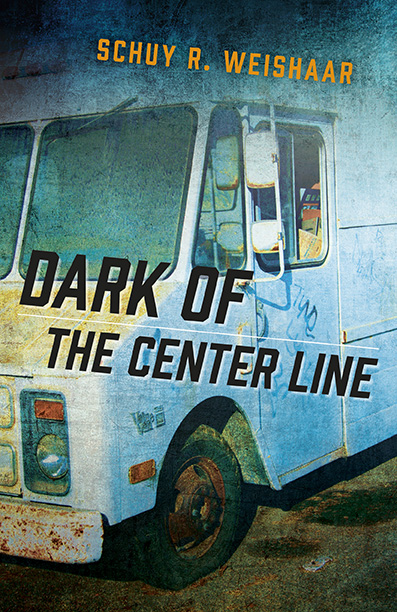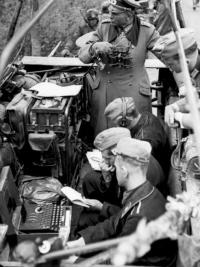
Dark of the Center Line
Abraham Jacobsen is misfit for this world, cursed with a past he cannot escape, burdened with dreams he cannot explain.
“It’s all darkness,” Jacob said. He swept his upturned palm in a half-circle, his arm outstretched, as though he were gesturing at something obvious, the way the maestro draws applause for the orchestra he’s just conducted, the orchestra which, more likely than not, would not have missed a note if the man had dropped dead after the first movement. Such a gesture is always an admission. Its meaning always the same: Can’t you see? For all my pains at controlling this, it is beyond me. It is out of my hands. It belongs to you, to them, to the world. It is the world. It’s the gesture of a fallen god.
The boy had asked him a childish question. “Why do the shadows get long when it’s almost night?”
“Look around,” Jacob said. “You’re right, the shadows are getting longer, but, look at the light too. Look at what’s happening to the light. Shadows are dark, always dark, even when they leak out across the grass into the street. But what’s happened to the light?”
The boy paused and peered into the distance. He squinted his eyes. Such conversation had become commonplace between father and son, and the boy had learned when to feign reflection. Finally he answered, “At lunchtime the light is brighter. The light gets dirtier closer to night.”
Jacob seemed pleased with this. “Yes, yes, the darkness slowly joins itself to the light, so slowly, so calmly, patiently. It winds itself around the center of light, sullies it, soaks it, until it’s permeated the light completely. Until the light is gone. Until the light has become darkness.” Jacob stood without moving or talking for a long time, gazing into the changing sky. The boy watched, too, as night overcame day, just as his father had said. As he looked up at the man, he saw the sunlight die in the distance on the tree-line behind him. Darkness washed over Jacob’s crumpled pork pie hat, his hairy face, his worn, denim work shirt, his wrinkled black trousers. He had become a silhouetted scarecrow or circus clown, a rigid strong-man, or a prophet. Darkness seemed to have overtaken his father, along with the rest of it, almost. There was a brightness in the eyes that was not extinguished with the sun, a brightness that was, for the moment, lost somewhere in the sky in some star-lit reverie. Jacob’s eyes seemed to blink with the same faint sparkle of those stars. It occurred to the boy that he couldn’t quite decide whether his father had merely been describing the dreary play of darkness and light or if he had cast the darkness into the sky with his words. Then the man’s eyes shot down, and their light was trained on the boy.
Jacob spoke, his tongue a darting flame, almost unable to keep up with the rambling words he spit into the air. His wide eyes never left the boy’s. “There was a time when everything was dark,” he said. “No sun. No stars, nothing. Just dark. Light has always been the exception, a luxury, a fake. Light and heat are accidents. People talk about balance and harmony—of darkness and light—as if they were equivalent, as if they weren’t out to devour one another. But darkness has its own harmony with cold, with stillness, with peace. Light is a mistake. Its very presence corrupts the dark and cold of space itself. Look up there. It’s darkness that overcomes all. There’s no balance. Our day is a delusion, a lie we tell ourselves, tell each other, because we fail to face the facts: that we are pathetic accidents of the light, that stupid life is part of what’s wrong with the universe. And worse than that—”
Then he seemed to remember himself and broke his gaze from the boy’s, shaking himself as one shakes off the cold. “Never mind,” he said blankly. “Let’s head home.” Jacob took a few steps. The boy didn’t follow. When he noticed what looked like a tear shimmer down the boy’s nose, Jacob softened a little and gestured somewhat obscurely toward him, as if to say, Come along or I don’t know or even I’m sorry. But, whatever it was intended to convey, it was also the maestro’s gesture. The sun had gone down now. It was night.
Abraham Jacobsen is misfit for this world. His peculiar gifts have cursed him with a past of good deeds he cannot escape, with dreams and visions he cannot explain, with a future as stone-set as the etchings on a grave marker. Now, just as he has found a suitable place to loose his haunted thoughts in the outer blanks of rural Illinois, Abraham finds himself the prime suspect in the murder of a local girl. He is edged in upon by a priest who wants to see him canonized, an ancient vigilante group with ties to the county’s founding fathers, the dead girl’s farmer father, and local law enforcement.
In his roving, Abraham has burned up the road of life in both directions, scorching and scarring as many as he has helped or healed. And the journey has only taken him deeper within the dark of
the center line, into a country nothing-world of fields, farms, and roads, a place that seems peopled with his own inner demons and bad memories. But does the dark of the center line lead somewhere
too?
Paperback Mar 25, 2016
978-1-78535-269-0
AMAZON US
e-book Mar 25, 2016
978-1-78535-270-6
AMAZON US
Categories:
0 comments on this article








